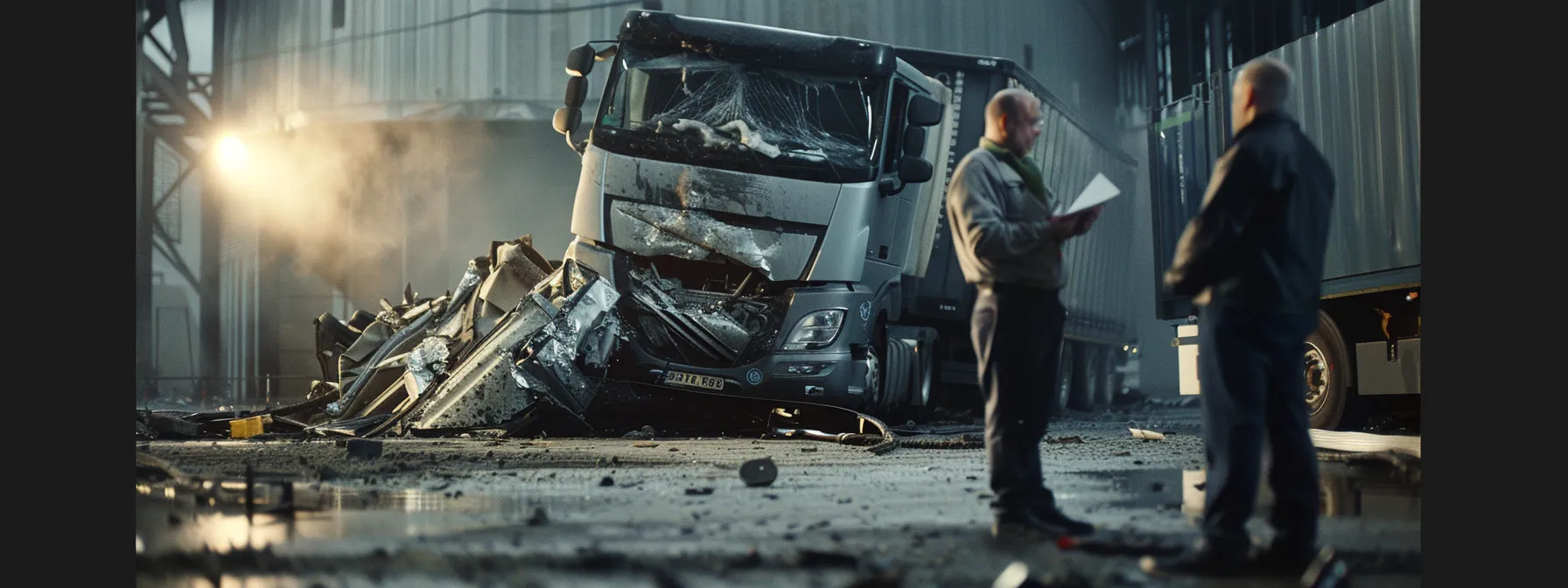Have you or someone you love been involved in a devastating truck accident in Texas? Knowing how to navigate the complex web of laws surrounding such events can be the difference between a dismissed claim and receiving the compensation you deserve for your pain and suffering. This guide provides essential insights into Texas truck accident laws, from understanding liability to pursuing your truck accident claim effectively. You will learn critical steps to take immediately after an accident, the importance of collecting data to reinforce your case, and the role fatigue or a driver’s license status might play in determining fault. For those seeking justice and relief from the aftermath of a truck accident, the forthcoming sections offer a roadmap to a successful legal outcome.
Key Takeaways
- Texas truck accident laws entail specific regulations and higher liabilities
- Timely legal action is crucial due to the statute of limitations
- Evidence from driver logs to medical records is vital for truck accident claims
- A thorough understanding of negligence and liability can maximize compensation
- Experienced legal representation is key in navigating truck accident claims
Understanding Texas Truck Accident Laws

In the realm of Texas truck accident laws, it is crucial to discern the key disparities between car and truck accident regulations. Individuals must navigate a complex network of federal and state regulations, such as electronic logging device mandates and stringent brake safety standards, tailored specifically for the trucking industry. The law offices experienced in personal injury are versed in the statute of limitations for truck accident claims in Texas, providing essential guidance in these time-sensitive cases. Moreover, common truck-related violations, including reckless driving and equipment failures, Contact Heil Law Firm often central to litigation. This subsection lays the groundwork for understanding how these laws and violations affect truck accident claims.
Key Differences Between Car and Truck Accident Regulations
One of the most striking distinctions between car and truck accident regulations revolves around the burden of proof. For truck accidents, one must understand the intricacies of the Federal Motor Carrier Safety Administration’s (FMCSA) Safety Measurement System (SMS) and how it impacts the liability of trucking companies and their drivers. Establishing negligence in truck accidents can thus hinge on a deeper layer of regulatory compliance, including adherence to prescribed service hours and maintenance protocols Contact Heil Law Firm, which govern the trucking industry’s operational standards.
Another paramount difference comes in terms of the potential consequences of truck accidents, often more severe than those involving only passenger vehicles. Incidents resulting in catastrophic injuries, such as paralysis, demand a comprehensive understanding of the increased liability and the associated fee structures that personal injury attorneys must navigate. Furthermore, Texas statute defines specific provisions for commercial vehicle accidents, including varied statute of limitations and holding companies to higher accountability for their fleet and employees. Contact Heil Law Firm for Personal Injury Services:
| Aspect | Car Accidents | Truck Accidents |
|---|---|---|
| Burden of Proof | Standard negligence | FMCSA regulations |
| Consequences | May involve personal injury | Often involves severe injury like paralysis |
| Legal Representation Fee | Typically based on damage severity | Adjusted for complex truck regulations |
| Statute of Limitations | Set period for filing a claim | Different limitations for commercial vehicles |
Federal and State Regulations Affecting Trucking Industry
In the intricate landscape of truck accident lawsuits, federal and Texas state regulations cast long shadows. The Federal Motor Carrier Safety Administration (FMCSA) sets forth “hours of service” rules, which are pivotal in determining whether a driver was operating within legal time constraints during an incident. Truck accident claims often leverage these regulatory frameworks, especially when linking fatigue to negligence. Texas law further heightens the scrutiny on trucking companies to maintain rigorous standards in the operation of their fleets, including maintaining a comprehensive insurance policy that covers potential disfigurement and other grievous injuries arising from severe accidents.
When cases proceed to trial, these regulations take center stage, informing the proceedings and underpinning the arguments of the prosecution and defense alike. For victims, these laws offer a structured path to compensation, making it imperative that the affected parties understand their implications:
- The strict “hours of service” regulations aim to prevent driver fatigue, a common contributor to road mishaps.
- An adequate insurance policy is vital in ensuring fair compensation for catastrophic injuries, including disfigurement.
- In the event of a trial, adherence to, or violation of, these regulations can significantly influence the jury’s verdict in truck accident lawsuits.
Statute of Limitations for Truck Accident Claims in Texas
The statute of limitations imposes a deadline for filing a truck accident claim in Texas, a critical factor for victims seeking justice. In the wake of a Houston truck accident, individuals have a limited period, generally two years from the date of the incident, to initiate legal proceedings. This time constraint underscores the risk of losing the right to compensation, pressing victims and their families to act promptly to protect their interests.
In incidents as complex as a slip and fall or a collision involving a commercial truck, the timely pursuit of a claim is paramount to ensuring justice is served. An experienced attorney can provide clarity on these time-sensitive issues, guiding clients through the legal labyrinth toward securing the compensation they deserve. Delays in addressing legal action can jeopardize a victim’s chance to recover losses, making an understanding of these limitations essential.
Common Violations Leading to Accidents
Recklessness on the part of truck drivers is a common violation that leads to devastating truck accident injuries. The urgency to adhere to tight delivery schedules may tempt some operators to ignore speed limits, resulting in loss of vehicle control and catastrophic collisions. It is the responsibility of both the drivers and their employing companies to ensure that such negligent behaviors are curbed to protect other road users.
Driving under the influence is another serious violation that compounds the risks inherent in operating a commercial vehicle. When police report that alcohol or substance impairment played a role in a truck accident, the statute of limitations begins to tick away for the injured party to claim just reparations. A seasoned lawyer can provide invaluable assistance in such cases, ensuring that the victims navigate the legal complexities to attain due compensation.
Determining Liability in Truck Accidents

Establishing liability in Texas truck accidents hinges on identifying negligent parties, which may include the driver, the transportation company, or even the vehicle manufacturer. An in-depth examination of duty of care and negligence is essential, alongside a clear understanding of Texas’ modified comparative fault laws, which can influence the outcome of a claim. Comprehending employer liability and the nuances of vicarious responsibility further clarifies the legal landscape for those seeking justice. These critical areas form the pillars of accountability in truck accident cases and are pivotal in securing rightful punitive damages for the injured.
Identifying Negligent Parties (Driver, Company, Manufacturer)
In Texas truck accident cases, it is critical to scrutinize the details to pinpoint which party — the driver, the company, or the vehicle manufacturer — failed in their duty. For instance, if a driver’s disregard for the speed limit leads to a collision causing severe spinal cord and head injuries, the liability may rest primarily on that individual. However, the employer’s policies on safety and driver conduct can also play a pivotal role in the legal assessment.
Moreover, Texas law considers the complex interplay of responsibility amongst all involved parties. Should an accident result from a defective vehicle part, the manufacturer might be held liable. A thorough investigation often reveals the percentage of fault assignable to each party, thereby dictating the direction of legal recourse for those enduring traumatic injuries and seeking compensation.
Role of Negligence and Duty of Care
Understanding the role of negligence is pivotal when determining liability in Texas truck accidents. Negligence occurs when a driver, behind the wheel, fails to exercise the care that a reasonably prudent person would under similar circumstances, leading to injury. An experienced advocate can discern whether a driver’s actions, or lack thereof, crossed into gross negligence, which implies a conscious disregard for the safety of others, intensifying the pursuit of justice for the injured party.
At its core, duty of care in truck accident cases is about the obligation to maintain a safe environment for all road users. When adrenaline-fueled decisions or preventable missteps result in injuries, the legal system must identify which parties failed to uphold this duty. Duty of care extends beyond the driver to include trucking companies and manufacturers, ensuring a comprehensive approach to holding the correct entities accountable for their actions.
Impact of Texas’ Comparative Fault Laws
In the landscape of a Texas truck accident lawsuit, the state’s comparative fault laws play a crucial role in assessing compensation. For instance, if an individual sustains a severe injury, such as internal bleeding or requires an amputation, the quality of life drastically diminishes. Texas law stipulates that if the injured party is found partially responsible for the incident, their entitlement to compensation may be reduced in proportion to their degree of fault, crucial when the stakes are as high as they are in cases involving serious injuries.
This comparative fault system ensures a fair assessment of liability, which is essential in truck accident cases where multiple parties could be at fault. An injury victim navigating the lawsuit process in Texas must understand how these laws can influence the final compensation, particularly in instances where their injuries have led to long-term disability or significant changes to their quality of life. A proficient attorney can aid in elucidating these complex regulations to secure just compensation for the injured party.
Employer Liability and Vicarious Responsibility
Within the complex framework of truck accident law in Texas, employer liability plays a critical role whereby companies may be held accountable for their drivers’ actions under the doctrine of vicarious responsibility. Employers must ensure adherence to regulations designed to prevent hazards such as drowsy driving, which poses a significant risk on the roads. If a trucker, fatigued from overexertion, causes an accident, legal scrutiny will extend to the employer’s oversight of hours of service and rest protocols.
Moreover, trucking companies are obligated to maintain their fleet to stringent safety standards, ensuring that threats like tire blowouts or brake malfunctions, which can lead to severe burns and other injuries in a crash, are minimized. When accidents attributable to neglected maintenance occur, affected parties may seek damage recovery based on the premise that the employer neglected its regulatory duties to prevent such dangers. Thus, ensuring the integrity of every tire and the reliability of each braking system is not just good practice; it’s a legal imperative that supports public safety and mitigates liability.
Steps to Take After a Truck Accident in Texas

In the aftermath of a trucking accident, immediate action is critical for those involved. Ensuring prompt medical care and safety takes precedence, followed by the necessary step of reporting the incident to law enforcement. Gathering conclusive evidence at the scene and informing insurance companies without delay are equally vital. This guide will cover practical measures one should undertake in these critical moments, from the preservation of evidence to the intricacies of communicating with insurers—all pivotal for safeguarding one’s rights after a truck accident.
Ensuring Immediate Safety and Medical Care
In the chaos following a truck accident, it is imperative for victims to prioritize their immediate safety by moving away from oncoming traffic or any potential hazards. Subsequently, securing medical attention is essential, even if injuries are not readily apparent. A failure to receive a prompt health evaluation in Dallas can not only jeopardize one’s recovery but may also impact the validity of future claims, as documentation of injuries is crucial for negotiation with insurance companies.
For accident victims in Texas, a swift call to emergency services ensures that medical professionals arrive promptly to address any injuries sustained. The documentation provided by these first responders is a vital component of the legal process for the accident. Medical records serve as tangible evidence of the injuries, laying a foundation for informed negotiations and potentially strengthening the victim’s case should litigation arise.
Reporting the Accident to Law Enforcement
Immediately after a truck accident, it is crucial to report the event to law enforcement. This action creates an official accident report that serves as a vital piece of information during legal proceedings, especially in cases involving semi truck accidents. An official report provides a neutral account of the incident, detailing the road conditions, the presence of tailgating, or other contributing factors, which is essential evidence in the United States legal system.
Accurate and timely reporting to authorities ensures the formal documentation of all relevant information. It’s important to note the responding officer’s name and badge number and to ask how to obtain a copy of the accident report. Here are the key points you can expect to find in the police report:
- Detailed descriptions of the accident, including the time and location.
- Statements from the involved parties and any eyewitness accounts.
- An assessment of any violations, such as tailgating, that may have contributed to the semi truck accident.
Collecting Evidence at the Accident Scene
At the scene of a commercial truck accident, plaintiffs must capture critical evidence to construct a robust claim for court. This includes taking photographs of the traffic conditions, vehicle damages, and any visible injuries. It is also imperative to record the truck’s license plate and insurance information, as these details aid in delineating responsibility and facilitating the car accident claim process.
Gathering eyewitness testimonies can significantly bolster a plaintiff’s case in a truck accident lawsuit. Individuals should collect contact information from bystanders willing to describe the incident, as their objective perspectives can be pivotal when presenting the case. The collected evidence will serve as the cornerstone of the plaintiff’s narrative in court, reinforcing the gravity of the accident’s impact on their life.
Informing Insurance Companies Promptly
After a truck accident, swift communication with insurance companies is an instrumental step. Victims in San Antonio must promptly report the incident to their insurer to initiate the transport of their personal injury claim, a protocol that adheres to Texas statutes. This immediate step initiates the legal process, sets the stage for potential jury involvement, and ensures accurate recording of incident details from the start.
In this critical phase, it is paramount that individuals consult with a personal injury lawyer before providing any statements to insurers. Demonstrating discernment can influence the expedience and efficiency with which the claim is processed, and aid the legal team in establishing a robust argument should the case advance to a jury trial. Engaging with insurance promptly can mitigate complications in truck-related personal injury cases, ensuring a smoother navigation through the legalities of transport accident recovery.
Gathering Essential Evidence for Your Claim

Securing the right evidence is paramount in Texas personal injury claims involving commercial vehicles. Comprehensive police reports, alongside witness testimony, can anchor a solid legal stance. Critically examining driver logs and vehicle maintenance records reveals patterns that may implicate negligence in cases involving a dump truck or other heavy-duty transport. Additionally, timely acquisition of electronic data from the truck’s onboard systems coupled with thorough medical records can paint a clear picture of the incident’s mechanics and the ensuing injuries.
Importance of Police Reports and Witness Statements
In the aftermath of a truck accident on Houston’s congested lanes, the police report operates as a disclaimer attesting to the facts as understood at the moment by law enforcement. This document crystallizes details like traffic patterns and driver behavior, which are pivotal when attributing fault, particularly in whiplash claims where causation and impact severity can be disputed.
Similarly, witness statements capture diverse perspectives on the incident, providing invaluable insights that may corroborate a victim’s account or unveil details overlooked in initial reports. Articulate testimonies have the power to shape the trajectory of a case, influencing how the law is applied and supporting plaintiffs as they seek justice for injuries sustained.
Obtaining Driver Logs and Maintenance Records
In Texas truck accident laws, obtaining driver logs and maintenance records is a decisive factor in proving negligence and securing a settlement for wrongful death or severe personal injury cases. These logs often contain critical evidence pertaining to the driver’s hours on the road, adherence to mandatory break periods, and any potential violation of transportation regulations, which are subject to strict inspection standards.
Thorough evaluation of vehicle maintenance records can reveal lapses in the required upkeep that might contribute to accident causation, such as brake failure or tire issues, bolstering a claim for negligence. For victims of truck accidents, including those involving related scenarios such as a dog bite during delivery operations, these details are fundamental in constructing a robust legal argument:
- Detailed scrutiny of electronic logging devices (ELDs) for compliance with FMCSA regulations.
- Inspection of maintenance logs to discover unaddressed mechanical failures or irregularities.
- Correlation of driver’s logbook data with the event timeline to highlight any discrepancies or oversights.
Preserving Electronic Data From the Truck
Preserving electronic data from the truck after an accident is indispensable in assessing responsibility and charting a course for claims related to damages. This data, which may pinpoint instances of distracted driving or substance abuse, serves as digital evidence that can reinforce a case when filing for liability insurance claims. It is the role of a meticulous paralegal and legal team to ensure this information is safeguarded and accurately reflects the moments leading up to the accident.
For the victims, electronic data extracted from the truck’s built-in systems provides a precise timeline and behavior analysis of the vehicle, which can be pivotal in proving negligence. Should the data suggest a breach of regulated driving hours or evidence of distracted driving, the captured information is crucial in establishing the scope of damages and building a robust liability insurance claim. Engaging a knowledgeable paralegal who can interpret electronic data effectively contributes significantly to streamlining the legal process.
| Electronic Data Type | Relevance to the Case | Impact on Liability Insurance Claim |
|---|---|---|
| Driver’s Hours of Service | Points to adherence or violation of FMCSA regulations | Establishes grounds for negligence or compliance |
| Vehicle Speed and Route History | May indicate distracted driving or substance abuse | Contributes to determining the cause of the accident |
| Event Data Recorder (EDR) | Details crash dynamics and pre-crash vehicle motion | Essential for correlate the driver’s testimony with physical evidence |
Medical Records and Documentation of Injuries
Medical records serve as a foundational element within Texas truck accident laws, documenting the extent of a victim’s injuries which could encompass severe afflictions such as spinal cord trauma. Personal injury lawyers critically appraise these records to establish a clear connection between the incident and the resultant injuries, fulfilling the duty of care owed to their clients. Comprehensive documentation not only substantiates the physical harm suffered but also becomes instrumental when negotiating with insurance companies or in the event of a funeral, evidencing the need for fair compensation.
After a truck accident, securing precise medical documentation is a vital step that personal injury lawyer emphasize for their clients. This ensures that all injuries, ranging from minor abrasions to critical spinal cord damage, are meticulously recorded and quantified, underpinning claims made to insurance companies. The thorough accounting of medical treatment received demonstrates the direct impact of the accident on the victim’s life and is essential for proper enforcement of the duty of care, which may extend to covering long-term healthcare costs.
Pursuing Compensation for Damages

In the pursuit of justice after truck accidents in Texas, victims must meticulously calculate medical expenses and future care needs while also seeking restitution for lost wages and diminished earning capacity. Equally critical is securing compensation for pain and suffering, a non-quantifiable loss, as well as exploring the prospects of punitive damages in cases where evidence shows egregious negligence. This section delves into mastering the art of quantifying tangible property damage and intangible losses to ensure victims garner the full compensation they are due.
Calculating Medical Expenses and Future Care Needs
Calculating medical expenses after a Texas truck accident begins with a thorough evaluation of current and anticipated healthcare costs. A lawyer specializing in truck accidents will collaborate closely with medical professionals to forecast the long-term implications of the injuries sustained. This comprehensive approach ensures victims can claim compensation that truly reflects the cost of emergency services, ongoing rehabilitation, necessary surgeries, and any future medical attention.
Alongside immediate healthcare expenses, victims often face the daunting prospect of continuing care, which may include physical therapy, medical equipment, or home modifications. Recognizing this, law enforcement and legal teams work diligently to construct a wrongful death claim or injury compensation package that encompasses these long-term care needs. The details provided by one’s mobile phone can offer additional insights, serving as a log for appointments and pain levels, thus contributing to the wrongful death claim or injury case:
- Cost analysis for initial hospital stays and emergency treatments post-accident.
- Projected evaluations of ongoing physical therapy and rehabilitation sessions.
- Estimates for medical devices, prescription medication, and potential future surgeries.
Recovering Lost Wages and Loss of Earning Capacity
In the wake of a truck accident, victims often face the dual financial strains of immediate income loss and the potential long-term inability to return to their previous earning capacity. It is essential that those affected by such motor vehicle incidents assert their rights to recover not only their lost wages from missed work but also compensation proportionate to the decrease in their future earning potential, especially when the injury impedes performance in their designated line of work, such as commercial delivery roles.
Legal experts focusing on truck accident cases in Texas comprehend the pressures endured by victims who, due to their injuries, are incapable of fulfilling their vocational duties. In cases where the accident is attributed to another party’s fault, whether it be an individual or a trucking company, an attorney will vigorously pursue an equitable settlement. This encompasses an analysis of past earnings and the injuries’ impact on future income to ensure that compensation reflects the financial burden of an uncertain economic future, including potential burial costs for fatal accident victims.
Seeking Compensation for Pain and Suffering
Securing compensation for pain and suffering is a critical aspect of truck accident laws, as it addresses the non-economic damages endured by victims. A collision involving a truck driver, trailer, and passenger vehicle often results in not only property damage but significant emotional distress. A meticulous legal representative seeks to ensure that the psychological impact of the accident is valued accordingly, factoring in the trauma and chronic pain that may not be evident in medical bills but resonate deeply with the affected individuals.
In Texas truck accident claims, quantifying pain and suffering often hinges on the intensity and duration of the victim’s discomfort and anguish. For instance, when a passenger in a vehicle is severely injured due to a truck driver’s negligence, the law provides avenues to claim recompense not just for tangible losses but for the psychological hardships that follow. Legal counsel strives to paint a clear picture of these sufferings in court, advocating for rightful compensation that mirrors the grave realities of such life-altering accidents.
Possibility of Punitive Damages Against Negligent Parties
In cases where trucking accidents in Texas are the result of egregious negligence, courts may deem the company liable for punitive damages. This form of compensation is awarded not merely as a remedy for the victim but also as a deterrent against future misconduct, particularly if intentional behaviors such as alcohol consumption by the driver were factors. Punitive damages send a strong message about the gravity of putting lives at risk, especially when severe injuries such as brain trauma are involved.
The court’s decision to impose punitive damages hinges on the demonstration of a company’s or individual’s gross negligence or malice. For instance, when a vehicle inspection uncovers a history of ignored maintenance that leads to a catastrophic event, punitive damages are considered to hold the responsible parties accountable, above and beyond traditional compensation. Such measures underscore the serious commitment to maintaining stringent safety standards within the trucking industry, aiming to prevent future accidents of a similar nature.
Navigating the Legal Process With a Truck Accident Attorney

Securing adept legal representation can vastly improve the outcomes for victims navigating Texas truck accident laws. This section highlights the benefits of hiring an experienced Texas truck accident lawyer who brings attentive scrutiny to witness statements and comparative negligence claims. It also delves into strategies for negotiating with insurance adjusters and underscores the importance of meticulous preparation for litigation should settlement discussions falter. Ensuring safety and justice for those affected by truck accidents hinges on these critical legal maneuvers.
Advantages of Legal Representation
Engaging a law firm with proficiency in Texas truck accident laws offers invaluable expertise when facing the nuanced regulations of the Texas Department of Transportation and the Federal Motor Carrier Safety Administration. These legal professionals adeptly navigate through complex cases involving heavy-duty vehicles, securing rightful compensation for damages including loss of consortium, which addresses the impact on familial relationships due to injuries sustained.
The benefit of having experienced legal representation extends beyond navigating the bureaucratic mazes. A seasoned attorney from a specialized law firm not only understands the intricate layers of trucking regulations but also possesses the negotiation skills essential for interacting with insurance adjusters. This ensures that clients receive a fair evaluation of their claims, leading to full compensation for their physical injuries and emotional suffering:
| Legal Aspect | Client Benefit |
|---|---|
| Understanding of Trucking Regulations | Ensures compliance with federal and state laws, maximizing compensation |
| Negotiation with Insurance Adjusters | Achieves fair settlement offers to cover the full scope of damages |
| Expertise in Loss of Consortium | Aids in obtaining compensation for intangible losses affecting family relationships |
Selecting an Experienced Texas Truck Accident Lawyer
Choosing an experienced truck accident lawyer is integral to navigating the complexities of Texas truck accident laws effectively. A proficient attorney will possess deep knowledge of the critical elements such as product liability, event data recorders, and the quantification of pain and suffering, which can significantly impact the verdict of your case. This specialized expertise is essential in managing the extensive paperwork, legal negotiations, and potential courtroom presentations that may arise, ensuring the pursuit of a fair expense recovery for their clients.
With the stakes high in truck accident cases, the right legal representation makes a consequential difference in achieving a favorable outcome. An attorney well-versed in dissecting evidence from event data recorders and asserting product liability claims can adeptly guide their clients through the demanding process. Their experience often translates into a powerful advocacy that strategically presents the client’s narrative, aiming to secure the maximum compensation for both economic and non-economic damages, such as pain and suffering.
Negotiating With Insurance Adjusters
Negotiating with insurance adjusters is a critical step in the aftermath of a truck accident, especially when factors like dram shop laws or text messaging while driving might be involved. The attorney’s role includes engaging expert witnesses who can attest to the weight of evidence, such as the impact of highway safety violations on the accident. This process requires a strategic approach to ensure that the victim’s damages are thoroughly evaluated and compensated appropriately.
Professional legal intervention is vital when insurance adjusters seek to settle claims swiftly and cost-effectively. An astute attorney leverages their knowledge of Texas truck accident laws, considering every detail from highway conditions to the driver’s text messaging records, before moving forward. They advocate unyieldingly for the client, ensuring the insurance offer reflects the full extent of the client’s losses and aligns with the justice they deserve.
Preparing for Litigation if Settlement Fails
When negotiations with insurance adjusters hit an impasse, transitioning to litigation becomes the next necessary step for those involved in truck accident cases. Preparing for court proceedings requires meticulous attention to demonstrating that the defendant was liable for the crash, such as in rear end collisions, and proving the extent of suffering endured by the plaintiff.
An astute lawyer will diligently piece together a compelling case, amassing evidence that not only pins liability on the defendant but also vividly depicts the plaintiff’s suffering. This preparation is crucial, as a well-structured argument enhances the likelihood of a favorable verdict, particularly in complex truck accident cases where causation and damages must be articulated clearly to the court:
| Case Aspect | Evidence Gathering | Presentation in Court |
|---|---|---|
| Rear End Collisions | In-depth analysis of traffic conditions and vehicle damage. | Clear illustration of the incident’s impact and the defendant’s negligence. |
| Suffering of Plaintiff | Collection of medical records and expert witness testimony. | Emphatic portrayal of the plaintiff’s physical and emotional distress. |
| Defendant’s Liability | Compilation of driving logs, maintenance records, and regulatory compliance. | Articulate argument establishing the defendant’s breach of duty of care. |
Conclusion
Navigating Texas truck accident laws is essential for securing justice and compensation for those affected by such incidents. A thorough understanding of the differences in regulations, evidence collection, and the importance of immediate action can greatly influence the outcome of claims. The expertise of a dedicated attorney is invaluable in managing the nuances of liability, negotiations with insurance adjusters, and legal proceedings. Mastery of this legal terrain empowers victims to advocate for their rightful compensation and ensures safety standards within the trucking industry are rigorously upheld.







